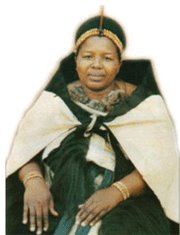

I mentioned that Swaziland is a Kingdom - Swaziland has been a monarchy ever since the Nguni people entered the territory where they lived under the leadership of Dlamini I. Today Dlamini remains the surname of the royal family, although I met Swazi citizens with the last name Dlamini that were not of royal blood. The country and people derive their name from a later king, Mswati I, who reigned during the mid 19th century.
The monarchy is dual, with the King or Ngwenyama (lion) ruling along with the Queen Mother or Ndlovukazi (she- elephant). The Queen Mother may be the King's natural mother which is presently the case or, on her death, a senior wife. The rules of succession are guarded secrets, but it is generally known that the king must be the only child of his mother and unmarried. Hence, the Swazi kings are always young men when they come to the throne.

The monarchy has endured throughout Swaziland's history. Even when Swaziland became a protectorate, when British colonial rule was established in 1903, the Monarchy was left intact. The British found it easier to rule indirectly through the existing power structure. They were interested in control of Swaziland’s resources, not the administration of its domestic affairs. As a result a trip to Swaziland is an exposure to a far more traditional Africa than say South Africa with its history of Settler rule.
The present monarch, King Mswati III ascended the throne in 1986 at the age of 18. He is regarded as the mouth-piece of his people and is described as umlomo longacali manga (the mouth that tells no lies). I heard one story in which the late king had said in a speech to his people that they must “open their ears”. The devoted population took his expression literally, and promptly set about having their ears pierced - a practice that had not previously existed in Swaziland.
With this kind of unqualified clout, imagine what he could do if the current king were to direct his influence towards Swaziland’s most pressing national crisis - the spread of HIV. He does not. Swaziland has just recently surpassed Burundi as the country with the highest percentage of HIV positive citizens in the world. The epidemic is confounded by a host of superstitious ideas, including the widespread belief that one can cure oneself from AIDS by having sex with a virgin.
King Mswati has made no public announcement or policy regarding HIV in the six years since he conceded publicly that it was a “disease”. Since then he has consistently ignored the issue, even redirecting foreign aid to finance the construction of another royal palace. What little assistance Swazis with HIV do get is provided by foreign aid and volunteers like Norman. With political parties banned and freedom of the press non-existent it seems unlikely that change will come soon.
King Mswati currently has fourteen wives as well as an extremely active extramarital life. In a country where 39% of the population is HIV positive it is more than likely that he will fall victim to his own refusal to face the problem that plagues his people. In fact speculations already abound, as in the very few recent photos of the king made public, it appears that he’s gained some substantial weight - a common symptom of the retro-virus used to treat AIDS patients.
My short visit to the Kingdom was enough experience with the monarchical system for me. The whole situation is sure to appear in the case for the merits of representative government in my classroom in the future.
2 comments:
I'm sure it is easy to judge a man, and King that is not a part of one's own culture. But his preponderance of wives and large fortune are no more strange or preposterous than Queen Elizabeth's, Prince Hans-Adams or King Abdullah Al Saud's fortune which I'm sure they doen't share with coal miners in Northern England or Prince Albert of Monaco, Prince Bernhard of the Netherlands. nèe Lippe Biesterfeld, King Leopold III of Belgium's or Jacque Chirac's illegitimate children. I think Mswati's race is what people are talking about here more than anything.
i appreciate your comments anonymous, and your comparisons to non-African monarchs are a valuable thing to have included here. It clarifies that the thing that is so objectionable about modern swaziland is political, not racial, and that the dangers created by an absence of representative government are universal.
Post a Comment